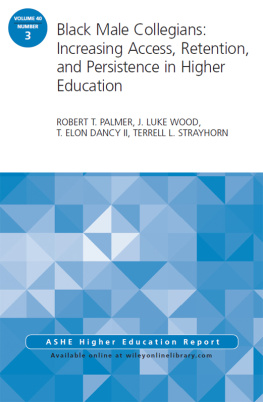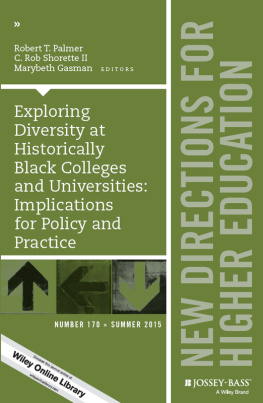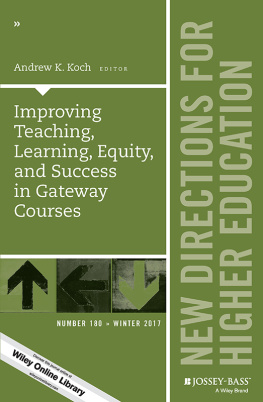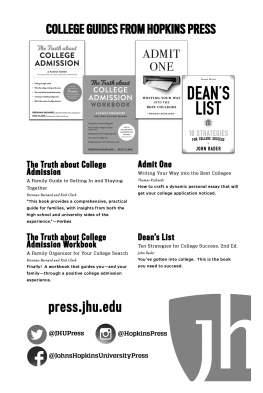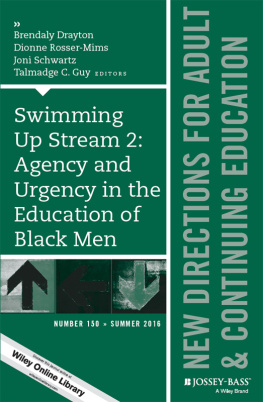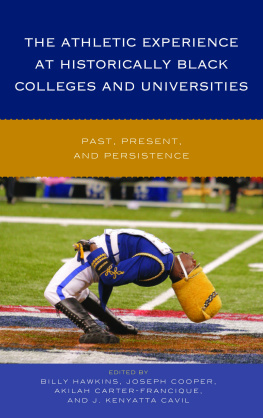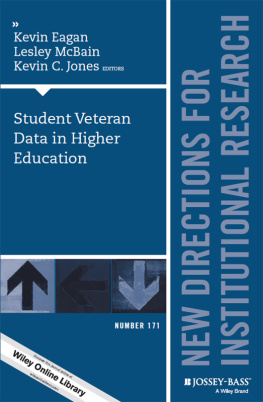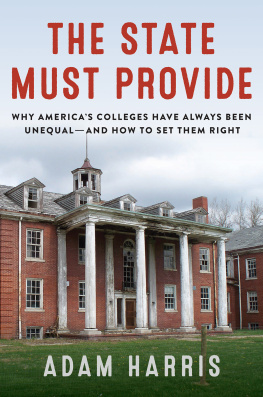
Black Male Collegians: Increasing Access, Retention, and Persistence in Higher Education
Robert T. Palmer, J. Luke Wood, T. Elon Dancy II, Terrell L. Strayhorn
ASHE Higher Education Report: Volume 40, Number 3
Kelly Ward, Lisa E. Wolf-Wendel, Series Editors
Copyright 2014 Wiley Periodicals, Inc., A Wiley Company. All rights reserved. Reproduction or translation of any part of this work beyond that permitted by Section 107 or 108 of the 1976 United States Copyright Act without permission of the copyright owner is unlawful. Requests for permission or further information should be addressed to the Permissions Department, c/o John Wiley & Sons, Inc., 111 River St., Hoboken, NJ 07030; (201) 748-8789, fax (201) 748-6326, www.wiley.com/go/permissions.
Cover image by Mustafahacalaki/iStockphoto.
ISSN 1551-6970 electronic ISSN 1554-6306 ISBN 978-1-118-94165-2
The ASHE Higher Education Report is part of the Jossey-Bass Higher and Adult Education Series and is published six times a year by Wiley Subscription Services, Inc., A Wiley Company, at Jossey-Bass, One Montgomery Street, Suite 1200, San Francisco, California 94104-4594.
Individual subscription rate (in USD): $174 per year US/Can/Mex, $210 rest of world; institutional subscription rate: $327 US, $387 Can/Mex, $438 rest of world. Single copy rate: $29. Electronic onlyall regions: $174 individual, $327 institutional; Print & ElectronicUS: $192 individual, $376 institutional; Print & ElectronicCanada/Mexico: $192 individual, $436 institutional; Print & ElectronicRest of World: $228 individual, $487 institutional. See the Back Issue/Subscription Order Form in the back of this volume.
CALL FOR PROPOSALS: Prospective authors are strongly encouraged to contact Kelly Ward (). See About the ASHE Higher Education Report Series in the back of this volume.
Visit the Jossey-Bass Web site at www.josseybass.com.
The ASHE Higher Education Report is indexed in CIJE: Current Index to Journals in Education (ERIC), Education Index/Abstracts (H.W. Wilson), ERIC Database (Education Resources Information Center), Higher Education Abstracts (Claremont Graduate University), IBR & IBZ: International Bibliographies of Periodical Literature (K.G. Saur), and Resources in Education (ERIC).
Advisory Board

The ASHE Higher Education Report Series is sponsored by the Association for the Study of Higher Education (ASHE), which provides an editorial advisory board of ASHE members.
- Ben Baez
- Florida International University
- Amy Bergerson
- University of Utah
- Edna Chun
- University of North CarolinaGreensboro
- Susan K. Gardner
- University of Maine
- MaryBeth Gasman
- University of Pennsylvania
- Karri Holley
- University of Alabama
- Adrianna Kezar
- University of Southern California
- Kevin Kinser
- SUNY Albany
- Dina Maramba
- Binghamton University
- Robert Palmer
- Binghamton University
- Barbara Tobolowsky
- University of Texas at Arlington
- Susan Twombly
- University of Kansas
- Marybeth Walpole
- Rowan University
- Rachelle Winkle-Wagner
- University of Nebraska Lincoln
Executive Summary
Improving college access and success among Black males has garnered tremendous attention. For example, there have been policy reports from the College Board Advocacy and Policy Center and the Center for the Study of Race and Equity in Education at the University of Pennsylvania. Furthermore, there are a number of journals, such as Journal of African American Males in Education, Challenge Journal: A Journal of Research on African American Men, Spectrum: A Journal on Black Men, among others, devoted to scholarly inquiry and providing insight into the experiences, conditions, and challenges facing Black males in education and beyond. At the same time, many educational researchers have sought to provide critical insight and have raised thought-provoking questions about Black males through peer-reviewed articles and books.
The focus on Black males is warranted. Many social scientists have noted that Black men account for 4.3% of the total enrollment at four-year postsecondary institutions in the United States. Incidentally, the percentage of Black men who are enrolled in college is the same as it was in 1976. According to national data, two thirds of Black men who start college never finish. The educational challenges of Black men have caused major concern among stakeholders in higher education. From this concern emerged a number of empirical studies, policy reports, journals, retention programs, and books focused on ways to help improve educational outcomes among Black male collegians. This monograph was conceived with a similar goal in mind. Specifically, the monograph provides a comprehensive synthesis and analysis of literature on factors promoting the access, retention, and persistence of Black men in postsecondary education. One of the key components of the monograph is its focus on the experiences of Black men in diverse institutional contexts (i.e., historically Black colleges and universities, predominantly White institutions, and community colleges). This approach recognizes the institutional heterogeneity of colleges and universities in America's higher education system as well as the diverse student characteristics and experiences within those contexts. By employing this approach, this monograph realizes that adopting a one size fits all method is not the most practical way to help improve the plight of Black men in higher education. The monograph includes recommendations and strategies to help advance success among Black males relative to the diverse institutional contexts of focus.
The monograph consists of four chapters. In the first chapter, we provided a justification for this monograph by discussing the underachievement of Black men throughout the educational pipeline. Keeping consistent with the aim of this monograph, we contextualize the academic achievement of Black men within the diverse institutional types of focus in this monograph. The first chapter is critical because it provides a foundation to help understand some of the challenges that Black men experience as they progress through the educational pipeline. In the second chapter, we highlight the preK12 experience of Black men, focusing specifically on factors that restrict or limit their participation in higher education. In the third chapter, we discuss programs and policies that help to facilitate access to higher education for Black men; more so, we also examine critical factors to their retention and persistence. Finally, in the fourth chapter, we discuss implications for research, policy, and practice. Given its unique approach and comprehensive focus, this monograph is an important resource for faculty, administrators, and staff in preK12 and postsecondary education. The monograph will also be rendered valuable by educational policymakers. Additionally, we surmise this monograph will be deemed a useful resource for scholars, institutional researchers, and graduate students who are interested in pursuing empirical research in this critical line of inquiry.
Dedications
Robert T. Palmer would like to dedicate this monograph to his mentors and friends in the academy, who have inspired him to be resilient and focused on succeeding in every endeavor. J. Luke Wood would like to dedicate this monograph to his son, J. Luke Wood, Jr., you inspire me toward excellence. T. Elon Dancy would like to dedicate this monograph to his mentees and the vast numbers of Black boys and men who endeavor to realize their dreams in U.S. educational institutions. Terrell L. Strayhorn would like to dedicate this monograph to all those motivated to excel in their respective endeavors, whose commitments and passions encourage, inspire, and fuel me daily.
Next page
